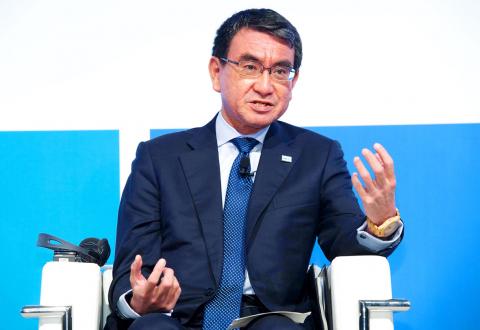The government yesterday said it would continue to seek Tokyo’s support and understanding after a top Japanese official said that Taiwan is unlikely to join the Comprehensive and Progressive Agreement for Trans-Pacific Partnership (CPTPP) because of the result of its referendum banning certain Japanese food imports.
“Japan’s reaction is understandable and this is going to be a strenuous challenge for Taiwan,” Executive Yuan spokeswoman Kolas Yotaka said, adding that the Cabinet has instructed government agencies to communicate with Tokyo.
The Ministry of Foreign Affairs in a press release said it would continue to engage in “earnest communication” with Japan and handle with discretion any possible actions Tokyo could take in response to the passage of a referendum on Nov. 24 that called for a continued ban on imports of Japanese agricultural and food products from Fukushima and four other prefectures after the 2011 Fukushima Dai-ichi nuclear power plant disaster.

Photo: EPA-EFE
A total of 7,791,856 people, or 78 percent of the votes cast, favored retaining the ban, further tying the hands of the Democratic Progressive Party (DPP) administration, which has sought to relax the major impediment to bilateral trade relations.
Speaking to reporters in Tokyo yesterday, Japanese Minister of Foreign Affairs Taro Kono reiterated Tokyo’s regret over the referendum’s passage, which he said has unfortunately made Taiwan’s bid to join the Japan-led CPTPP unlikely.
“If this [Taiwan’s import ban] violates WTO regulations, Japan does not rule out taking the matter to the WTO. In addition, the CPTPP pact is expected to take effect this year and it is very regrettable that this matter has made it unlikely for Taiwan to join the partnership,” Kono said.
It was the first time Kono has directly connected the import ban on Japanese food products with Taiwan’s chances of joining the CPTPP.
The ban has also resulted in the suspension of the Taiwan-Japan Economic Partnership Committee, which was established in 2013 as a platform for discussing economic, trade and investment issues.
After the conclusion of the annual Taiwan-Japan trade and economic meeting in Taipei on Nov. 30, Taiwan-Japan Relations Association Secretary-General Chang Shu-ling (張淑玲) conveyed Taiwan’s hope of being included in the CPTPP to her Japanese counterparts through different channels.
“We hope that Japan could offer us more assistance, including through the exchange of information,” she said.
Chinese Nationalist Party (KMT) Vice Chairman Hau Lung-bin (郝龍斌), who initiated the referendum, in a press release said that Japan’s use of the ban as a threat showed that the DPP’s claim that Taiwan-Japan relations are “at their best” is a lie.
“Taiwan and Japan have always had an uneven trade relationship. Taiwan holds a trade deficit of NT$600 billion [US$19.45 billion] with Japan. Haven’t we bought enough?” Hau asked, adding that the Taiwan-Japan relationship should not be built solely on meeting Japan’s demands.
According to Ministry of Finance statistics, Taiwan had a trade deficit of NT$634.8 billion with Japan last year.
Additional reporting by Lee Hsin-fan and CNA

The US government has signed defense cooperation agreements with Japan and the Philippines to boost the deterrence capabilities of countries in the first island chain, a report by the National Security Bureau (NSB) showed. The main countries on the first island chain include the two nations and Taiwan. The bureau is to present the report at a meeting of the legislature’s Foreign Affairs and National Defense Committee tomorrow. The US military has deployed Typhon missile systems to Japan’s Yamaguchi Prefecture and Zambales province in the Philippines during their joint military exercises. It has also installed NMESIS anti-ship systems in Japan’s Okinawa

TRAGEDY STRIKES TAIPEI: The suspect died after falling off a building after he threw smoke grenades into Taipei Main Station and went on a killing spree in Zhongshan A 27-year-old suspect allegedly threw smoke grenades in Taipei Main Station and then proceeded to Zhongshan MRT Station in a random killing spree that resulted in the death of the suspect and two other civilians, and seven injured, including one in critical condition, as of press time last night. The suspect, identified as a man surnamed Chang Wen (張文), allegedly began the attack at Taipei Main Station, the Taipei Fire Department said, adding that it received a report at 5:24pm that smoke grenades had been thrown in the station. One man in his 50s was rushed to hospital after a cardiac arrest

PUBLIC SAFETY: The premier said that security would be tightened in transport hubs, while President Lai commended the public for their bravery The government is to deploy more police, including rapid response units, in crowded public areas to ensure a swift response to any threats, President William Lai (賴清德) said yesterday after a knife attack killed three people and injured 11 in Taipei the previous day. Lai made the remarks following a briefing by the National Police Agency on the progress of the investigation, saying that the attack underscored the importance of cooperation in public security between the central and local governments. The attack unfolded in the early evening on Friday around Taipei Main Station’s M7 exit and later near the Taipei MRT’s Zhongshan

ON ALERT: Taiwan’s partners would issue warnings if China attempted to use Interpol to target Taiwanese, and the global body has mechanisms to prevent it, an official said China has stationed two to four people specializing in Taiwan affairs at its embassies in several democratic countries to monitor and harass Taiwanese, actions that the host nations would not tolerate, National Security Bureau (NSB) Director-General Tsai Ming-yen (蔡明彥) said yesterday. Tsai made the comments at a meeting of the legislature’s Foreign Affairs and National Defense Committee, which asked him and Minister of National Defense Wellington Koo (顧立雄) to report on potential conflicts in the Taiwan Strait and military preparedness. Democratic Progressive Party (DPP) Legislator Michelle Lin (林楚茵) expressed concern that Beijing has posted personnel from China’s Taiwan Affairs Office to its